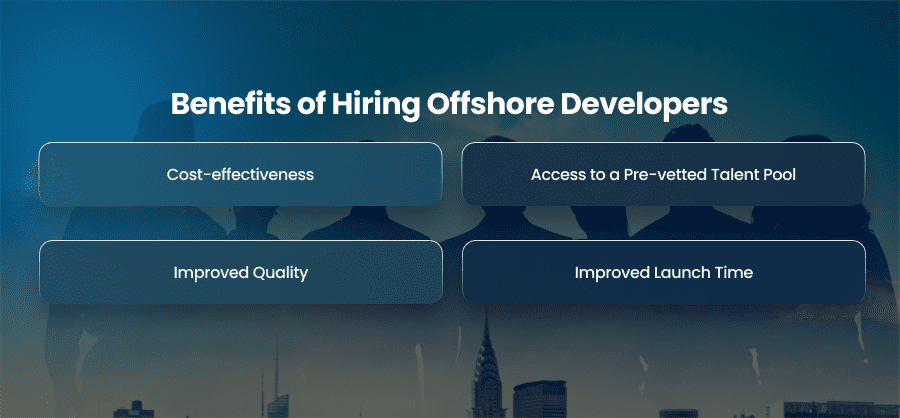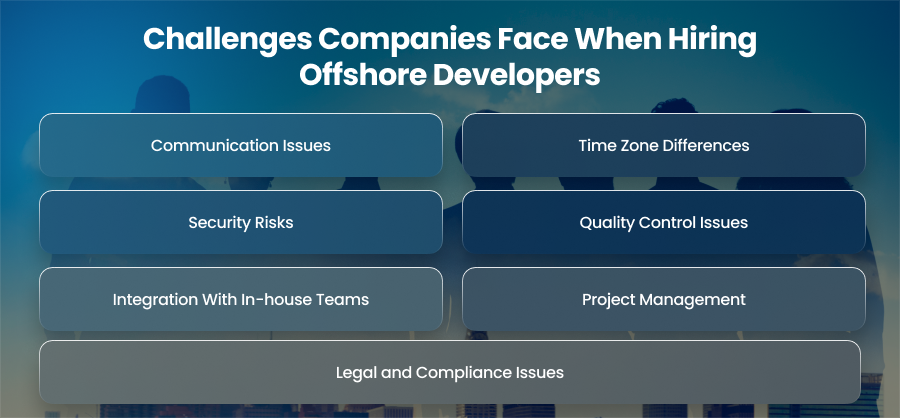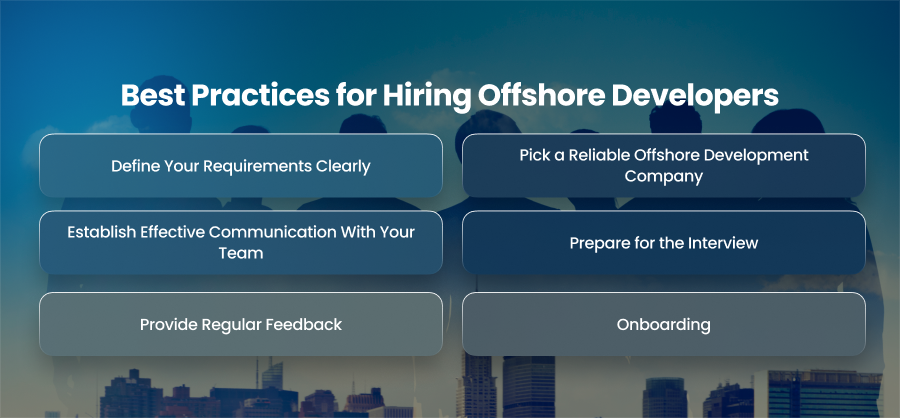Offshore development is gaining a lot of momentum with each passing year. Last year, the market size of offshore development was valued at $122 billion. Moreover, it’s projected to reach $283 billion by 2031. Hence, this indicates a CAGR of 10.13%.
These statistics indicate a growing appreciation and appetite for offshore software development. Moreover, many startups and even enterprises are moving towards hiring offshore teams to cut down on hiring and sourcing costs on in-house teams.
However, there are a few challenges that make many companies hesitant to build offshore development teams. So, in this CodinCops guide, we will critically evaluate these challenges and also discuss some best practices for hiring offshore developers.
Offshore Development
Offshore development refers to hiring an external team or a team located in a different country to build software. It enables businesses to acquire specialized skills and takes advantage of the price-to-quality ratio around the world. For example, if you consider hiring offshore developers in North America, it can cost you around $50-$300/ hour. However, hiring from Latin America will cost you around $25-$105/hour.
Furthermore, as globalization is increasing, offshore development has become a great way for strategic collaboration between organizations and software development resources around the world.
Benefits of Hiring Offshore Developers

Cost-effectiveness
One of the primary benefits of offshore development is that it allows access to a high level of expertise at an extremely low cost. Moreover, countries with low costs provide the same excellent development outsourcing services and good communication skills. Also, even companies like Google, Microsoft, and Siemens also have offshore development teams working for them.
Access to a Pre-vetted Talent Pool
When companies look to hire only on-site developers, they tend to limit themselves in terms of skills they can get. However, companies that do hire offshore developers get access to a pool of pre-vetted and talented developers with diverse skill sets. For example, JavaScript is used more in the USA as compared to the UK. So, there is a higher chance you will find top JavaScript developers in the USA with more developed skill sets than those in the UK.
Improved Quality
When companies hire offshore developers, they allow the best developers to engage with different cultural ideas and creative ideas. Moreover, innovative points of view can open up new waves of opportunities. Also, companies nowadays prefer developers with narrow and specific expertise.
But, because of these specified requirements, 77% of businesses face difficulties in hiring for specific roles. However, outsourcing provides the flexibility your company needs by cooperating with developers with specific technological needs.
For example, you can hire a React developer to create the front end of your application. You can also hire Node developers to build your application’s backend. It’s also important to keep in mind that offshore development and outsourcing open up resources for internal team strengthening.
Improved Launch Time
By building offshore development teams, companies can operate 24/7. This expedites the development stage and enhances your development workflow. As a result, this ensures that your goods or services will be launched on schedule and before your competitors.
Furthermore, can have more options for scaling, as cooperating with offshore developers offers more flexibility.
Challenges Companies Face When Hiring Offshore Developers

Communication Issues
Despite the many benefits of offshore development, businesses continue to face significant barriers to communication. Project delays and misunderstandings can result from linguistic and cultural issues. Therefore, it is crucial to employ collaborative technology and produce precise documentation in order to assist close the gap and overcome these obstacles.
Time Zone Differences
Offshore developers work in different time zones. These differences can cause unnecessary delays and can make decision making slow and disrupt workflows. You can mitigate this issue by overlapping working hours and using asynchronous communication strategies.
Security Risks
Offshore development often involves sharing sensitive data and intellectual property. Hence, this makes security a major concern. So, companies should implement strong NDAs and data encryption techniques. Moreover, they should also have robust compliance measures to protect their assets.
Quality Control Issues
Following best practices and guaranteeing code quality can be challenging when working with remote teams. But by using automated testing and frequent code reviews, you can quickly get over this. You should also concentrate on employing developers who have a history of upholding high standards.
Integration With In-house Teams
The offshore crew must understand the internal workflow and procedures. Inefficiencies may result from a lack of cohesiveness. So, you should establish clear workflows and promote team bonding to facilitate better integration.
Legal and Compliance Issues
Countries have different labor and data protection regulations. You must ensure that hiring overseas developers complies with national and international regulations to avoid legal problems.
Project Management
Managing an offshore team requires clear project scopes and deadlines. The success of the can be affected due to misalignment in expectations, lack of supervision, and missed deadlines. Hence, you should agile methodologies and project management tools to help keep your projects on track.
Best Practices for Hiring Offshore Developers

Define Your Requirements Clearly
First of all, you must define your requirements clearly before hiring offshore developers. You should set SMART requirements. Moreover, this makes them clear and quantifiable. Also, they should align with project goals.
Pick a Reliable Offshore Development Company
Working with experts from respectable outsourcing companies that have a strong track record is also essential. They must also have a history of completed projects similar to yours that were successful and positive client feedback.
Prepare for the Interview
Interviewing developers is the next step after choosing the company to work with. You ought to assess them in light of the aims and objectives you have established for yourself. Additionally, you can query them about the following:
- What methodology do you use?
- Do you offer post-deployment services?
- What pricing models do you offer?
- How will you ensure data security on my project?
Establish Effective Communication With Your Team
You have to establish efficient communication with your developers to ensure viable cooperation. This process must resolve all the prominent challenges. Set a schedule for regular meetings according to the time zone your developers are working.
Furthermore, have an intro call with your selected developers. This will provide you insights into how they communicate with their organization.
Provide Regular Feedback
Next, you should establish a system for exchanging feedback with chosen developers. This will guarantee that your project consistently meets its fundamental requirements. Furthermore, you have to ensure all the feedback is timely irrespective of your decision.
Onboarding
Finally, you should start the process of onboarding your selected developers. You should ensure that your team has access to all the necessary documentation and information for efficient developers.
Final Words
Hiring offshore developers may be a long and even difficult process. However, you may effectively develop your web apps and even cloud solutions if you identify suitable people and assemble your team.




